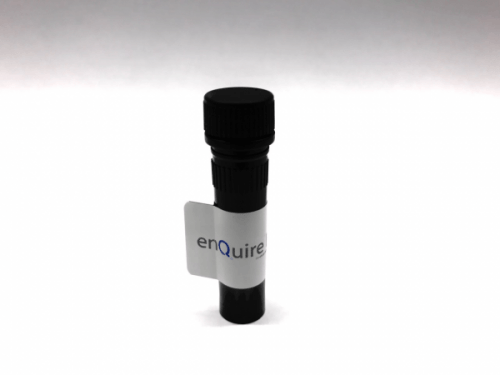Human Ubiquitin-conjugating enzyme E2 D3 Recombinant Protein Product Attributes
Product Type: Recombinant Protein
Recombinant Ubiquitin-conjugating enzyme E2 D3 based upon sequence from Human
Host: QP6863 protein expressed in E. coli.
Tag: His-SUMO
Protein Construction: A DNA sequence encoding the Homo sapiens (Human) Ubiquitin-conjugating enzyme E2 D3, was expressed in the hosts and tags indicated. Please select your host/tag option, above.
Recommended Applications: Immunogen, Protein Standard, Cell culture, or Other Cell Biology Applications.
Application Notes: Please contact us for application specific information for QP6863.
Bioactivity Data: Untested
Full Length? Full Length
Expression Region: Met1 – Met147
Amino Acid Sequence: MALKRINKEL SDLARDPPAQ CSAGPVGDDM FHWQATIMGP NDSPYQGGVF FLTIHFPTDY PFKPPKVAFT TRIYHPNINS NGSICLDILR SQWSPALTIS KVLLSICSLL CDPNPDDPLV PEIARIYKTD RDKYNRISRE WTQKYAM
Purity: Greater than 90% as determined by SDS-PAGE.
Reconstitution Instructions: Concentrated protein in liquid format. Reconstitution is not necessary.
Concentration of Human Ubiquitin-conjugating enzyme E2 D3 Protein:
Endotoxin Levels: Not determined.
Buffer: Tris-based buffer, 50% glycerol
Storage Conditions: Store at -20C to -80C.
| Recombinant Human Ubiquitin-conjugating enzyme E2 D3 Protein General Information | |
|---|---|
| Alternate Names | |
| UBCH5C, UBC4/5, E2(17)KB3 | |
| Curated Database and Bioinformatic Data | |
| Gene Symbol | UBE2D3 |
| Entrez Gene ID | 7323 |
| Ensemble Gene ID | ENSG00000109332 |
| RefSeq Protein Accession(s) | NP_003331.1 |
| RefSeq mRNA Accession(s) | NM_003340.6, NM_181886.3, NM_181887.2, NM_181888.3, NM_181889.2, NM_181890.2, NM_181891.2, NM_181892.3, NM_181893.2 |
| UniProt ID(s) | P61077 |
| UniGene ID(s) | Hs.518773 |
| HGNC ID(s) | HGNC:12476 |
| COSMIC ID Link(s) | UBE2D3 |
| KEGG Gene ID(s) | hsa:7323 |
| PharmGKB ID(s) | PA37126 |
| General Description of Recombinant Human Ubiquitin-conjugating enzyme E2 D3 Protein. | |
| Accepts ubiquitin from the E1 complex and catalyzes its covalent attachment to other proteins. In vitro catalyzes ‘Lys-11’-, as well as ‘Lys-48’-linked polyubiquitination. Cooperates with the E2 CDC34 and the SCF(FBXW11) E3 ligase complex for the polyubiquitination of NFKBIA leading to its subsequent proteasomal degradation. Acts as an initiator E2, priming the phosphorylated NFKBIA target at positions ‘Lys-21’ and/or ‘Lys-22’ with a monoubiquitin. Ubiquitin chain elongation is then performed by CDC34, building ubiquitin chains from the UBE2D3-primed NFKBIA-linked ubiquitin. Acts also as an initiator E2, in conjunction with RNF8, for the priming of PCNA. Monoubiquitination of PCNA, and its subsequent polyubiquitination, are essential events in the operation of the DNA damage tolerance (DDT) pathway that is activated after DNA damage caused by UV or chical agents during S-phase. Associates with the BRCA1/BARD1 E3 ligase complex to perform ubiquitination at DNA damage sites following ionizing radiation leading to DNA repair. Targets DAPK3 for ubiquitination which influences promyelocytic leukia protein nuclear body (PML-NB) formation in the nucleus. In conjunction with the MDM2 and TOPORS E3 ligases, functions ubiquitination of p53/TP53. Supports NRDP1-mediated ubiquitination and degradation of ERBB3 and of BRUCE which triggers apoptosis. In conjunction with the CBL E3 ligase, targets EGFR for polyubiquitination at the plasma mbrane as well as during its internalization and transport on endosomes. In conjunction with the STUB1 E3 quality control E3 ligase, ubiquitinates unfolded proteins to catalyze their immediate destruction . | |
Limitations and Performance Guarantee
This is a life science research product (for Research Use Only). This product is guaranteed to work for a period of two years when stored at -70C or colder, and one year when aliquoted and stored at -20C.




There are no reviews yet.